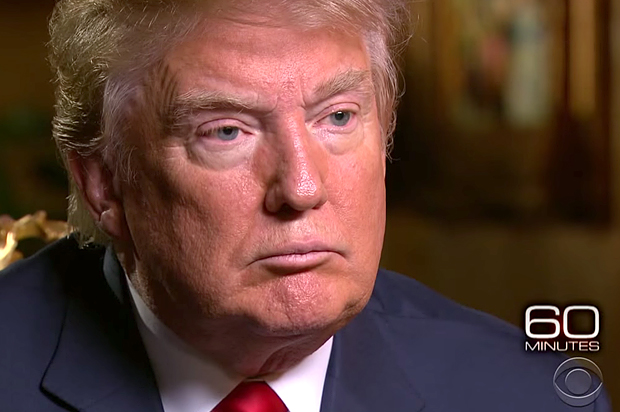With the release of Donald Trump’s tax plan on Monday, which proposes widespread cuts on all income levels — and would reportedly add over $10 trillion to the federal deficit over the next decade (a number that incorporates the presumed economic growth) — the GOP’s fear that he would be going against Republican orthodoxy and raise taxes on the wealthy turned out to be entirely unfounded. Anti-tax activist Grover Norquist absolutely loves the plan, and said on Twitter that it would create “Jobs. Jobs. Jobs.” (Apparently these so-called fiscally responsible conservatives have forgotten about the Debt. Debt. Debt.)
While this trickle-down plan was surely a relief to conservatives, Trump still goes against GOP orthodoxy on certain other issues — most notably free trade. Indeed, the New York billionaire has been very critical of trade agreements like NAFTA and the proposed Trans-Pacific-Partnership (TPP), and if elected president, he has said that he would end these trade deals and renegotiate what he calls “fair trade” deals. On Sunday’s episode of “60 Minutes,” he told Scott Pelley:
“We will either renegotiate [NAFTA] or we will break it. Because, you know, every agreement has an end… Every agreement has to be fair. Every agreement has a defraud clause. We’re being defrauded by all these countries… Scott, we need fair trade. Not free trade. We need fair trade. It’s gotta be fair.”
Trump, of course, assumes that foreign leaders are simply much smarter and better at negotiating than American leaders, as if they had all read his bestselling book “Art of the Deal.”
(“I have great respect for Mexico and love their people and their people’s great spirit,” Trump previously said, “The problem is, however, that their leaders are far smarter, more cunning, and better negotiators than ours.”)
This is not only an ignorant assumption, but also just plain childish. Previous trade deals were not poorly negotiated by American leaders, as Trump claims — they simply weren’t negotiated with the American working class in mind, but corporations. Take the TPP, which the Obama administration has pushed hard for, to the great dismay of progressives and unions. The administration has 28 advisory committees, which are overwhelmingly dominated by corporate interests and free trade associations. As Christopher Ingraham writes in the Washington Post,
“Of the 566 committee members, 306 come from private industry and an additional 174 hail from trade associations. All told they represent 85% of the voices on the trade committees.”
The remaining 15 percent is made up of representatives from labor organizations, academia, NGOs, law and other organizations.
No wonder trade deals are so advantageous for corporations.
Trump is certainly right that trade deals are not fair, but it’s not a question of fairness for Mexico or America or any other country; it is a question of fairness for the working and middle classes of the world and the dominance of corporations. A perfect example of how trade deals favor corporations over people is the little known “Investor-state dispute settlement” (ISDS) provision, which appears in just about all trade deals. The ISDS is a provision that was first introduced in a 1959 trade deal between Germany and Pakistan, developed to protect foreign investment from political turmoil in another country.
If, for example, a left-wing government attempted to nationalize their natural resources, as so many have before, an oil corporation that had invested in their natural resources could sue the country for lost profit through international law, as long as the two countries had a trade deal with the ISDS provision. Not compensation for the lost investment, mind you, but for potential profits that were lost. This quickly got out of hand in the ’90s and ’00s when corporations began suing countries for enacting regulations that may have hurt the companies profit (e.g., environmental regulations, safety regulations, etc.). The most notorious example comes from tobacco giant Phillip Morris, which is currently suing Australia for lost profits after the country enacted a plain-packaging law, which does not allow branding on cigarette packs, and has been shown to reduce smoking in young people. In other words, big tobacco is suing Australia for costing it youthful customers.
Beyond pro-corporate provisions like the ISDS, free trade and globalization is inherently good for capitalists and bad for labor (and a major reason why Marxists have long called for an international worker movement, rather than domestic ones). The trade deals and technological innovations of the past few decades have made capital incredibly flexible and mobile, meaning that it is very easy today for corporations to pick up and leave one region or one country for another when domestic unions or regulations begin to curtail their bottom line.
So then, the Donald certainly has a point when he says our free trade is not fair. But his nativist solutions are not sound for the long term. Progressives like Sen. Bernie Sanders, I-Vt., and Sen. Elizabeth Warren, D-Mass., also criticize trade deals, much more accurately than Trump, as being crony-capitalist agreements that promote the interests of corporations over people. In my view, globalization is inevitable, and the only way to stand up to multinational corporations and the mobility of capital is to develop an international workers movement, which is, of course, no easy task. In the short term, cronyist trade deals like the TPP must either be blocked or renegotiated without corporatist provisions like the ISDS.
The future of America’s trade deals will largely depend on the 2016 elections, but the fact that Trump and Sanders are both shining a light on our corrupt “free trade” can only be a good thing.

